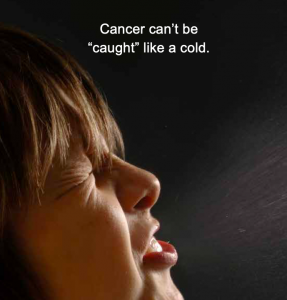
03 Aug Jumpstart the Cancer Talk with Children for Emotional Health
My children were 5 and 7 when I was diagnosed with stage IV oral cancer. It’s a disease that cannot be hidden under clothing. My caregivers and healthcare providers were so focused on me; we didn’t consider how my illness was affecting our children. I regret not seeking professional attention for them during that time, but we didn’t think of it.
My 5-year old daughter inspected everything I served carefully. “Mom, did you take a taste with this fork?” She reverted to her baby voice which always alerted me something was going on.
“No, honey, I touched the fork to my lip to see if it was too hot for you.” I replied in my hoarse whisper.
 “Well, I don’t want it.” It’s easy to respond by saying, ‘Come on, that’s ridiculous. Stop that silliness.’ But, that response isn’t productive. My husband, a doctor, explained to her that she won’t get sick from sharing with me. That didn’t work either because we weren’t addressing the root cause: her feelings.
“Well, I don’t want it.” It’s easy to respond by saying, ‘Come on, that’s ridiculous. Stop that silliness.’ But, that response isn’t productive. My husband, a doctor, explained to her that she won’t get sick from sharing with me. That didn’t work either because we weren’t addressing the root cause: her feelings.
As my symptoms got more severe during radiation; the coughing, choking, difficulty speaking, the more her behavior became belligerent. She would just hit me out of the blue, ignore me, or stick her tongue out. I would sit her on my lap and push a raspy sound out, “Honey, tell me why you are angry. What did I do?” She would bound off saying, “Bad Mommy.”
Months after my recovery, my daughter still wouldn’t kiss me. She was intuitive and afraid of losing me: she didn’t want to commit to another day of loving me. Her feelings were never confronted and continued to affect her behavior.
She acted out making it easy for us to know an issue was still brewing. Sometimes, it isn’t so obvious! A year after my recovery, my son, 2 years older than our daughter, was shopping with Grandma for a birthday card. He found a Get Well card. “Let’s buy this for Mom.” Grandma had to tell him that I wasn’t sick anymore.
Ask questions to identify the emotions a child feels:
- Do you feel sad because I am sick?
- Do you feel jealous of other kids who don’t have a sick parent?
- Do you feel angry I don’t have energy to do things with you?
- Are you mad at me for being sick?
- Are you confused about what might happen to me?
Questions can help you find the balance between not enough information and too much.
Since my voice was compromised during treatment, finding a book about understanding cancer would have been an easy solution. However, I could not find one to help start the conversation with our children. When I reached my 10-year cancer-free anniversary, I had to mark it. There was no better way than filling the void for a children’s book to minimize fear and promote dialogue about cancer. ‘M.C. Plays Hide & Seek’ emphasizes feelings children experience and ways to address their emotions in a healthy, comfortable way. It’s everything I wished I had for my children. Since its launch in early 2021, it has been awarded the Mom’s Choice Gold Award, Story Monsters Approved seal, the 5-Star MidWest Book Review and lots of testimonials from parents and children.
Tips to jumpstart the cancer talk with children and grandchildren:
- Ask questions to demonstrate a willingness to talk about your cancer.
- Find a book about cancer to read together.
- Let them know whom they can call if they want someone to speak with.
- Offer the services of a social worker, school counselor or hospital family program.
- Remind your child their feelings matter. Guarantee them you are doing your best to get better.
The more effort you put into opening lines of communication, the more you will foster emotional health. Talking about feelings helps children see their world clearly and understand it as best they can. You got this!
 Eva Grayzel
Eva Grayzel
Master Storyteller and Visionary Survivor
Author of:
M.C. Plays Hide & Seek
Mom’s Choice Gold Award Winner and Readers Favorite 5-Star Rating


